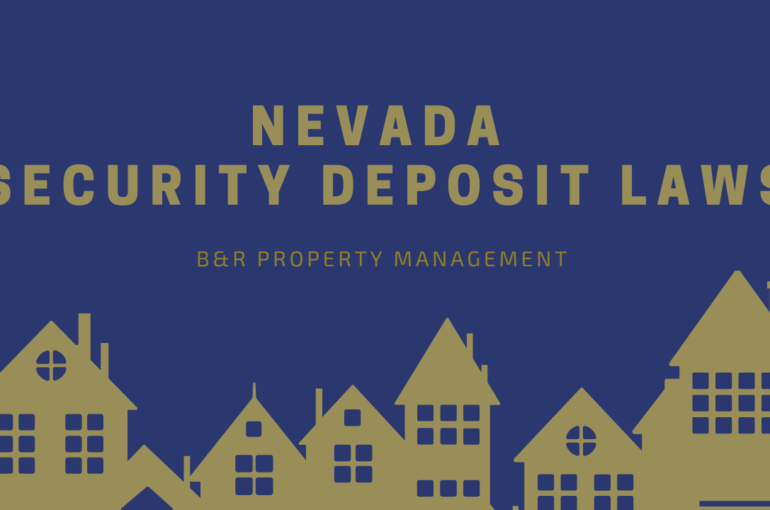Nevada Security Deposit Laws

As a landlord, requiring security deposits from tenants can be extremely beneficial. A tenant’s security deposits can help a Nevada property owner protect their rental units and make any repairs that may need to happen should the tenants cause any damage. These are some of the many benefits that a landlord may experience when collecting a security deposit or surety down payment:
- Unpaid utilities: When a tenant is renting out a unit on a landlord’s property, most, if not all, of the utilities will be their responsibility. Should the tenant fail to make these rental payments to the landlord, deductions can be made from the security deposit or surety bond to cover the costs by the landlord.
- Excessive cleaning costs: In most cases, every lease agreement clearly states that the renter is responsible for leaving the rental unit in the same condition it was when they moved in, aside from normal wear and tear.
If the tenant is excessively unclean in the unit (ex. Allowing garbage to pile up for long periods of time), then a landlord may make deductions to the down payment to cover cleaning fees. - Unpaid rent: If a tenant fails to pay rent on time, then they are breaching the lease or rental agreement. In case of missed rent monthly rent, Nevada landlords are entitled to withhold the tenant’s security deposit to cover for the rent.
- Lost income: If a renter decides to break their lease early and abandon the premises, then the landlord is permitted to withhold a reasonable amount of the down payment or surety bond.
- Damage to the property: If a tenant abuses the rental unit or causes damage beyond normal wear and tear, the investment owner may claim the down payment or surety bond to pay for the repairs upon the end of the tenancy. It is important to understand the difference between normal wear and tear and negligent damage.

Every state has different laws and regulations when it comes to security deposits, and Nevada is no exception. So, here is a guide to Nevada security deposit laws for you to become a successful landlord.
Nevada’s Security Deposit Limit
Most state laws include a limit to how much a landlord can charge their tenants for a security deposit. In Nevada, the maximum amount a landlord can charge is 3 months’ rent. If both the landlord and tenant agree, surety bonds may be used as deposits.
A Nevada landlord may also ask for an additional pet deposit if applicable, and this is usually between 1-2 months’ rent. However, due to the Federal Fair Housing Act, landlords may not ask for a pet deposit from renters with service animals.
Non-Refundable Fees
Some states may allow property owners to claim non-refundable fees, however Nevada does not. With the exception of a rental agreement that may include a reasonable, non-refundable cleaning fee, remaining in compliance with Nevada law means that no lease may contain any non-refundable security deposit fees.
Storing a Tenants’ Security Deposit
Many states have rules and regulations when it comes to how a landlord may be allowed to hold the security deposits. However, Nevada has no specific laws on this matter, other than landlords being required to provide a receipt in writing to their tenants after collecting the security funds.
Written Notice After Security Deposit Receipt
A landlord in Nevada is required to notify their renters when the deposit is received with a signed written receipt if the tenant requests it.
Reasons a Landlord May Withhold Security Deposit Fund in Nevada
In Nevada, a property owner may only use a tenant’s deposit after the tenant has vacated the rental premises. The funds can only be used to cover the following reasonable costs:

- Unpaid rent. The tenants were not able to pay their rent.
- The cost of repairs needed for damage caused by the tenant. This damage must be a result of the tenant failing to comply with their responsibilities, and the security fund cannot be withheld for any reasons related to normal “wear and tear” in the premises.
- Cleaning costs deductions. These deductions must be reasonable and lawful.
A Walk-through Inspection
In many states, a walk-through inspection of the rental property prior to the tenant’s move-in date is required by the local landlord-tenant laws. This is not the case according to Nevada law. Landlords are not required to provide a move-in checklist or walk-through at the beginning of the tenant’s lease.
However, it is strongly encouraged that the landlord and tenants are on the same page about the condition of the rental unit when signing the lease agreement to avoid future security deposit tenant disputes.
Returning a Security Deposit in Nevada
A landlord in Nevada has 30 days after the end of the tenancy to refund the remaining portion of the security deposit to the tenant, alongside an itemized list of deductions. This statement should be given to the tenant personally or be sent via mail to the provided forwarding address or tenant’s present address by landlords.
If the tenant wishes to dispute any of the security deposit deductions mentioned in the itemized list, they can provide the surety with a written response. This must happen within 30 days of receiving the statement by landlord.

If a landlord fails to return the security deposit funds within 30 days of the rental agreement ending, the tenant will recover the entire security deposit, plus any legal fees that may have occurred while recovering the deposit in court.
Further, if the landlord fails to return the deposit in a timely manner, the court can decide that a sum may be granted to the tenant, however the amount cannot be more than the security deposit.
The small claims court will decide this by considering if the landlord acted in good faith, the degree of harm the landlord has caused the tenant, and the course of conduct between the landlord and the tenant.
Change in Property Ownership
In Nevada, if a landlord decides to sell or transfer the ownership of their rental property, they legally must do one of the following:
- Notify the tenant in writing of the new ownership of the rental property, and that the security deposit funds have been transferred over to them. They also must include the new landlord’s contact information.
- Refund the security deposits to the tenant, minus any deductions.
Bottom Line
For landlords who own a rental property in Nevada, it can be hard to stay up to date on all of the changing rental and security deposit laws. A good property management company will be able to ensure you remain in compliance with all state laws while saving you time, money, and stress. If you’re a landlord and you’d like help with navigating Nevada law, get in touch with the best property management company in the area, B&R Property Management.
Disclaimer: this article should not be used in place of legal advice from a licensed attorney in your state. Laws frequently change, and this post may not be updated at the time of you reading it. Please contact us for any questions that you may have on this subject or any other aspect of your property management needs.



